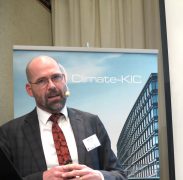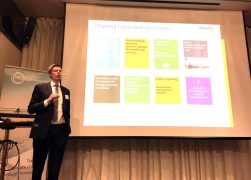Green Finance to Catalyse the Transition to Sustainable Cities
In The News
08 May 2017
The urban environment is increasingly being recognized as a critical player in transitions towards a sustainable society. Cities worldwide are prioritising climate change action. Yet, financing the transition proves to be one of the key challenges. This was the issue Climate-KIC and the City of Gothenburg intented to find solutions to at a workshop in March.
Thus far, it has been difficult for cities to generate the finance needed to get low-carbon projects off the ground. From the financial side, focus has traditionally been on the single bottom line. Social and environmental aspects have not been up to much internal scrutiny amongst financers. Now, however, financers are increasingly requesting data on the environmental and social performance of their investments. They want to signal that they are conscious and ahead of the game. It is therefore crucial to identify the key to unlocking these green investments.
Local governments can play an important role in connecting the dots and accelerating the green bonds market. They account for the majority of public sector investments and many cities have set ambitious climate targets. An example of such a city is Gothenburg, Sweden, which is regarded a pioneer in the realm of green bonds. In 2013, the City established the world’s first municipal green bond. Thus, Gothenburg was the perfect backdrop for Climate-KIC’s workshop on Green Finance on 21-22 March 2017.
Green Finance Workshop
Invited to the two-day workshop organised by Climate-KIC Nordic and the City of Gothenburg were policy-makers, investors, researchers and consultants. The goal was to inform, explore and encourage the use of green finance initiatives in order to accelerate green projects and low-carbon infrastructure at the municipal level. The workshop included presentations from prominent speakers from local governments and the financial sector, who shared their experiences and lessons learned.

Mats Olausson
On the first day of the workshop, Magnus Borelius, chairman of the City of Gothenburg’s Treasury Group, and Sara Pettersson, from the office for Urban Development, reflected on their experiences and success factors that enabled the City to get green bonds off the ground.
Critical success factors include leadership, a well-functioning environmental department with high levels of expertise on sustainability projects, and close trust-based collaborations and transparent discussions between the financial and environmental departments.
During the workshop, the presenters argued that the use of green bonds leads to more engagement and an enhanced level of awareness regarding sustainability projects among financers.
The experiences in Gothenburg demonstrate that green city leadership can accelerate low-carbon urban development, while at the same time boost the city’s reputation. This is reflected by the City of Gothenburg’s receiving the UN Climate Solutions Award 2016 and the WWF’s Earth Hour Capital Award in 2015.
Establishing the role of the finance sector

Antti Kontio
How can city governments draw on financial institutions to reach the required levels of investment to reach their climate targets? Representatives from financial institutions issuing green bonds, including Mats Olausson from SEB, Björn Bergstrand from Kommuninvest and Antti Kontio from Municipal , reflected on the role of the finance sector in realizing the untapped potential of green finance. All emphasized that they expect to grow their green loan portfolio significantly during the next decade as they are experiencing increasing demand from investors for green projects.
In fact, a key message from the finance sector was that
It is the availability of suitable investment opportunities, not the availability of capital, that represents the limiting factor to the growth of green finance.
Many investors have signed the UN’s principles for Responsible investment, thereby committing to integrate social and environmental considerations into their investment decisions.
To be able to ensure that investors’ money goes to financing green projects, financial institutions and municipalities need to co-develop internal procedures that guarantee the effective selection, verification, monitoring and reporting of green projects. For instance, to ensure that the financed projects generate a long term positive environmental impact, the issuers have set up external review committees consisting of environmental experts.
Suggested next steps
The experiences of the front runners demonstrate the great potential of green finance as a catalyst of urban sustainability transitions. Yet, tasks lie ahead and during the workshop a number of conditions were identified that need to be addressed:
- Increasing awareness about the potential and benefits of green bonds among municipalities.
- Developing clear definitions and criteria for green projects to make sure that they are really promoting green innovation and not ‘greenwashing’.
- Making projects bankable. This includes smaller projects with potential higher risks and smaller projects led by actors that have less experience with working with investors and donors. A possible solution would be to bundling smaller projects with higher risks with larger projects with lower risks.
- Creating an enabling policy environment. An enabling environment for green finance needs to be created at the international and national level. Governments can incentivize the use of green bonds using tax incentives.
- Developing tools to assess and evaluate the benefits of projects. There is a need for standardized tools to assess and compare the impacts of projects in order to bring green finance procedures into the mainstream.
The Role of Climate-KIC
The Climate-KIC community can play an important role in addressing these challenges. During the workshop, the knowledge, expertise and competencies of the attendants was mapped out and avenues for future projects and collaborations on these issues were discussed. Climate-KIC will follow-up on these ideas in the coming months, aiming to take the learnings from Gothenburg concerning the present state of the municipal green finance landscape and build upon it. This will be done by initiating the process of establishing procedures and best practice for packaging municipal green assets, engaging investors and reporting on active projects.
Climate-KIC aims to facilitate the coming together of actors from all sides of the process in order to work with tangible existing green assets and uncover together how to adequately package, promote and structure them so that their attractiveness becomes apparent to investors.
Through its flagship programme Low Carbon City Lab (LoCaL), Climate-KIC aims to unlock climate finance for cities. LoCaL is a community of investors, solution providers and cities that together develop new and innovative ways to provide cities with training, project preparation and finance support as well as impact assessment tools.
LoCaL is always on the lookout for new ideas and partners and thus welcomes innovators and pioneers interested in defining the mechanisms that will help fund low carbon and resilient action at city level. For more information about LoCaL and its activities, please visit http://local.climate-kic.org/



